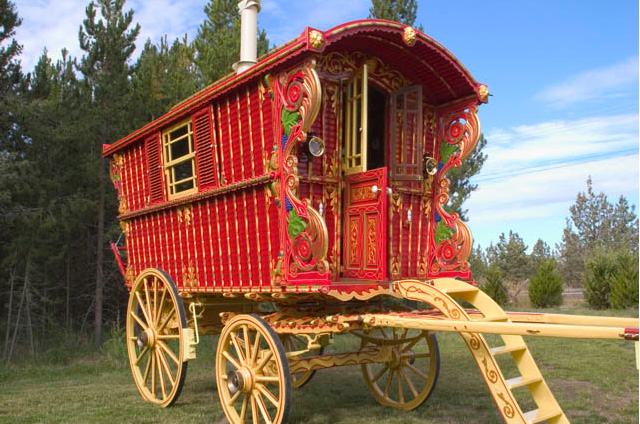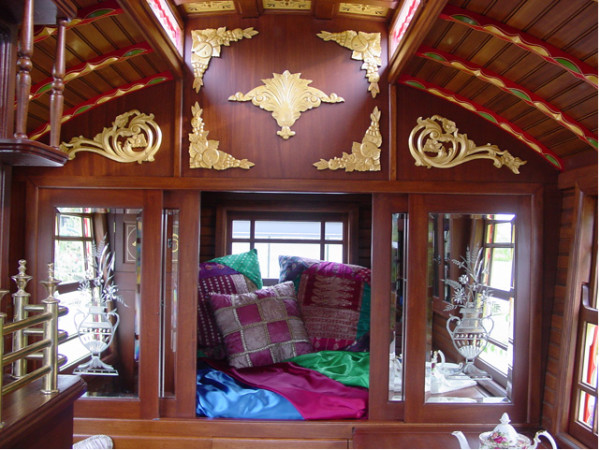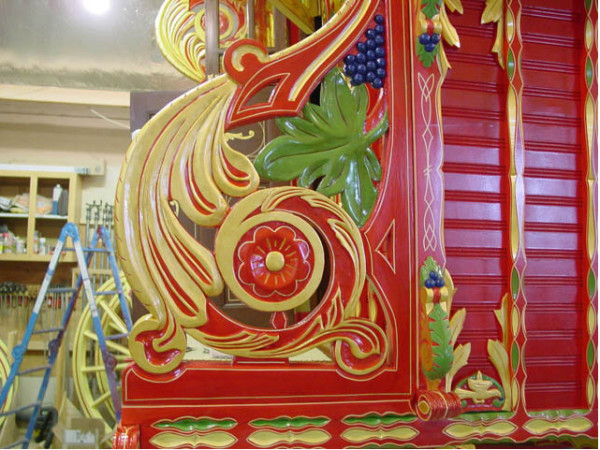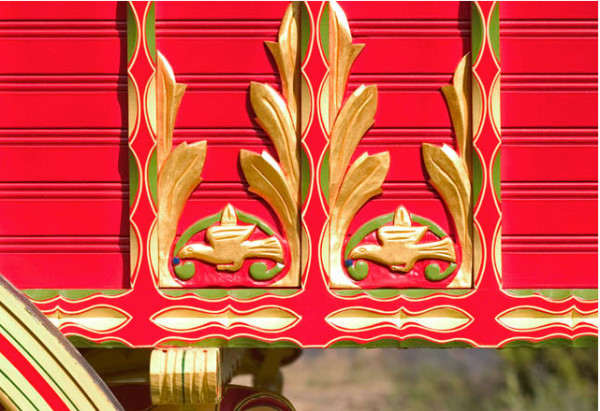Wally and Victoria Roth of Bend, Oregon have experience in building exquisite carousel horses, cabinets, boat building and yacht restoration, but their designs really come to life in their re-creations of their Romani “Gypsy”* Caravans. Their goal for the custom design is to come as close as possible to the original look and feel of the caravans that can still be found around England today.
The Romani were a group of people who arrived in Europe from northern India around the 14th century. Their travels in wagons much like the Roth’s took them across the continent to Great Britain and even into North America, Brazil and Australia. Many of the Romani groups traveled and lived in these wagons which they called a vardo, waggon, van or caravan. They were traditionally horse-drawn and decorated and painted in bright colors with gilded accents. The British Romani during the mid-1800s to the early 20th century were thought to have the most artistic designs.
The Roth’s caravans feature Victoria’s decorative painting skills and decor which includes using silk, satin, velvet and lace. The couple do all the construction, carving and painting of their caravans. Their designs are not meant to travel down the road, but Wally and Victoria offer their works of art as a tiny home, guest house, art studio, meditation or healing space or just a wonderful addition to a backyard.
Photos by Gypsy Vans by Roth
NOTE
* Many Romani feel the term “gypsy” is a derogatory term. The word “gypsy” is a short form of the word “Egyptian” since many cultures at the time mistook them for being from Egypt. The term “gypsy” should never be used in connection with any other nomadic group of people other than the Romani as they are the only group to have been mistaken as being Egyptian. To class any other group as being “gypsy” or “gipsy” is a form of racism built on anti-Romani stereotypes and prejudices. Hence the Tiny House Blog puts the term in quotes.
By Christina Nellemann for the [Tiny House Blog]







Thanks for the wonderful article. What a work of art…love it.
What beautiful, beautiful work and creativity by the Roths. I am in awe…. Also I really appreciate the cultural sensitivity of the NOTE in this post. I’m impressed and appreciative. Thank you much.
All the best…
my goodness, how fun!
The artwork is beautiful!
The ultra PC disclaimer at the bottom of the article is kind of a bummer.
But those Gypsy vans are friggin’ neat! Exceptional craftsmanship there.
Yes, I could do without the sensitivity training,too, and as others have pointed out, the article has a few incorrect statements, including the claim-as-fact about the origins of the Romani. Leaps and bounds in DNA research involving migratory routes have overturned a lot of presumptions, and created new riddles about origins. Instead of a paragraph on PC, why not another photo of those beautiful wagons? Congratulations to the builders for their stunning work.
My friend has adopted two Romani children, and she has told me on several occasions that many Romani view the term “gypsy” as an insult of the worst sort. I assume she knows better than I do.
I don’t think it’s PC; I find it to be kind to point out that some find the term offensive. Furthermore, the Romani people suffered tremendous injury and heartache at the hands of Hitler during WWII. There is no need to use a term that a good many of them find hurtful or offensive. Better to err on the side of kind. Always.
The folks I am familiar with even prefer being called Travelers, especially when people are not aware of the Romani history. N PC involved, just respect, in my humble opinion.
Travelers are of Irish/English descent. Some have settled in the SE US.
Sorry, but I need to clarify a major historical inaccuracy here. “The British Romani during the mid-1800s to the early 20th century were thought to have the most artistic designs and were woodcraft masters” is not true at all. Driving an Airstream today doesn’t mean we are excellent Airstream builders.
These “waggons” were designed and built by the English wagon builders of the era who were also supplying Showman’s wagons and other, less flashy accomodations. Although built in many places, several cities became particularly well-known for their design, painting, and carving. A good starting point to learn about the craft is “The English Gypsy Caravan” which documents much of this nearly lost art. How their use entered modern society to become the RV is well written in “Gypsies and Gentlemen”.
I always enjoy the Tiny House Blog every morning with my coffee- but I think today’s entry is my all-time favorite.
I wish the Roths would do a coffee table book of photographs of their amazing work. I would certainly buy it.
The comments at the end of the story made me wonder about all of these American “Gypsies” who are being featured on American reality TV shows. They certainly don’t look descended from Indian ancestors (which I had heard before, in fact); it makes me wonder if they have just co-opted the term to denote a certain lifestyle they feel represents a certain stereotype?
The wikidiaper entry on British Travellers, or Romanichals, shows a vardo style wagon. The Romanichals are Romany of mixed ancestry.
http://en.wikipedia.org/wiki/Romanichal
http://en.wikipedia.org/wiki/File:Romanichal_wagon.JPG
Agreed. The first 2 sentences say all we need the rest are a finger waggling that turns people off.
Awesome re-creations, its nice to see true craftsmanship is alive. I’d sure like to have one of those for a guest house. Maybe could have a set of hiway wheels just to move it around
Wow! Thank you so much for writing about our products! Wally and Victoria have been creating Gypsy Caravans for over 13 years, and just became the first US manufacturer or the Dutch/Belgium caravans, known as Roulottes. The Roulottes are more budget friendly, and accessible. You may check out our website for those at http://www.roulottesusa.com/ And as always, you can find us at http://gypsyvans.com/ Thanks again Tiny House Blog!
Termed “Travellers” in the UK. We are often in Wales and really don’t see these beautiful caravans the way I had thought I would. They are usually more traditional caravans (trailers). This is one of the most beautiful caravans I’ve seen. Thank you for building with such lovely craftsmanship!
Thank you for the comments and the corrections (thanks George). The Tiny House Blog has featured many posts on “gypsy” wagons without incident, but one particular post fired off a long comment thread about the racism issue around the term. Once bitten…twice shy.
Not everyone is critical of what you did, Christina, and in fact, I am grateful. Thanks. Happy New Year.
I also appreciate the sensitivity and the wikipedia link. Very informative. And gorgeous pictures. Thanks!
Absolutely beautiful. Unfortunately, traditional horse-drawn caravans have mostly been forced off the roads by the high volume, and speed, of motorised vehicles which make it so dangerous now to progress at horse-pace. We still occasionally see horse-drawn caravans on British roads but they are few and far between these days, sadly.
Nancy, strictly speaking in the UK the term ‘travellers’ applies exclusively to Irish travellers and New Age travellers. Roma are a distinct and separate grouping, with different origins their own unique and ancient culture. However, these terms (including ‘gypsy’) are increasingly used interchangeably. The near disappearance of horse-drawn caravans and their replacement by modern caravans (trailers) has made the distinctions between different nomadic groups much less obvious to outsiders.
@Tube Did you feel gypped by the “Politically Correct” (PC) note at the end? Well I did because that fact was not mentioned and it is at the root of the impoliteness, even racistness, of the term.
Below quote from here–> http://racerelations.about.com/od/diversitymatters/a/Five-Terms-You-Might-Not-Know-Are-Considered-Racist_2.htm
“Gypped” is arguably the most commonly used racist term in existence today. If someone buys a used car that turns out to be lemon, for instance, he’s likely to complain, “I got gypped.” So, why is the term offensive? Because it equates the Gypsy, or Roma peoples, with being thieves, cheats and con artists. When someone says that they “got gypped,” they are essentially saying that they were conned.
Explained Jake Bowers, editor of Travellers Times, to British newspaper the Telegraph: “Gypped is an offensive word, it’s derived from Gypsy and it’s being used in the same context as a person might once have said they ‘jewed’ somebody if they did an underhand business transaction.” But don’t take Bowers’ word for it. If you’re still debating whether or not to use the verb “gypped,” consider that Philip Durkin, principal etymologist at the Oxford English Dictionary told the Telegraph that there’s “scholarly consensus” that the word originated as a “racial slur.”
To be fair, I have yet to meet a Jew (Orthodox, Reform, secular, etc.) who has objected to the word “Jew”, even though there is the term “to jew someone”. I mean, only anti-Semites seem to use Jew as an adjective, but as a noun, it’s completely acceptable, whether the speaker is Jewish or not.
Just as the noun “Jew” has important semantic differences from “to jew”, “Gypsy” has important semantic differences from “to gyp”.
That said, I usually use the term “Romani”. Since I’m an American living in America, I sometimes use “Gypsy” to clarify, since most adults here don’t know who the “Romani” are.
Over here, there isn’t nearly the anti-Roma sentiment that you find in Europe. To most people here, the stereotype is of Esmerelda from Disney’s The Hunchback of Notre Dame (the movie uses “Gypsy” neutrally, and no other term is given), plus Gypsy curses from fiction and the romanticized ideal of a heroic thief. (Note the word “romanticized”; people aren’t thinking of the average criminal.) Fortune tellers, bright bohemian clothing, free spirits traveling wherever they want.
(It’s also worth noting that even in “Gypsy curse” stories, the curse is usually cast in response to a wrongdoing instead of out of nowhere — at least in the US, where again, cultural assumptions are different than in Europe.)
Tl;dr The nuances are important, especially with dialectal and cultural differences. After all, as they say, “We are separated by a common language.”
Hope that wasn’t too long and ranty.
Wow… regardless of the history or definition, this wagon has all of the bling and then some.
A little over the top for me as a daily sleeper, but I can see the fun in a weekend fairy tale.
Beautiful creations. Englis Gypsy Caravans http://www.amazon.co.uk/English-Gypsy-Caravan-C-H-Ward-Jackson/dp/0715387898 is the only book I ever seriously considered stealing from the library. (Don’t worry, I didn’t do it!) I was almost the only person who borrowed it again and again for several years since I was about 13 and it started my longing for a tiny mobile living space. Perhaps we could all agree to acknowledge there is controversy over the word Gypsy and move along now. Some people use it without meaning any disrespect and not all (insert preferred PC term for gypsy here)are insulted by its use.
Whatever word you use to describe any particular ethnic, cultural or interest group can eventually end up being just as insulting as the word it replaces if the attitude of the user is derogatory. It would be nice if we didn’t have to get into these slanging matches every time a term somebody finds controversial is used, especially since there isn’t a universally agreed upon substitute, though in the EU Roma or Romani is the accepted term. http://www.inotherwords-project.eu/content/project/media-analysis/terminology/terminology-concerning-roma
Perhaps adding a simple disclaimer at the beginning of an article acknowledging use of a particular word is controversial and requesting it not become the subject of outraged response might help. Probably not. Sigh.
You are missing the Roulotte USA link on the site! I am so happy that somebody is making these in this country.
I truly enjoy viewing these beautiful homes. They put me in a dream mode. I’d love to try living in one for a year!
There was an article about their garden several years ago in our local paper. She uses the Mittleider method of growing plants in her green houses. There’s more on their garden here:
http://victoriasvegetables.com/
So, gypsies find the term offensive, especially so when referring to others, yet exhibit no qualms about thieving “roma” from Roman?
How odd.
http://www.ahdictionary.com/word/search.html?id=R5319200 Roma doesn’t come from Roman, it’s related to the word rom, man. Just more people calling themselves, essentially, people.
People mistook the Gypsies for being Egyptian because (1) Romani lived in Egypt (you can trace this through belly dance,) and (2) because the Gypsies themselves told people they were Egyptian thinking this would be more acceptable than telling people where they really came from in the North of India. Many Gypsies embrace this name as being unique to them while other terms such as “gypo” are totally unacceptable.
Yes, I agree at one time the word gypsy was used in very negative way against a lot of groups of nomadic people.
The word gypsy is now used as lifestyle of freedom. Romance,travel and life more with less in smaller spaces. One can have the “Gypsy Spirit” like wonder lust.
That is the beauty of languages, as a word’s meaning can change they way the word is used and it’s meaning from one generation to the next.
The word “Gypsy” has always been beautiful word to me since I was child some 50 years ago.
It’s been 2 years since someone left a comment, but it’s worth saying. “Gypsy soul” and other such implications are racist. If you liked living in urban neighborhoods, would you say you were “black at heart”? You better not. In the same manner, don’t say that you have a “gypsy soul”.
Its sad that you mentioned that gypsy was a racist term, and you just have non-Romas arguing about “their right” to call Roma people a word they find offensive.d